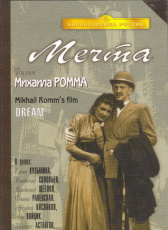A picture that might be rather difficult for present-day non-Russian cinema lovers to understand, Mikhail Romm's "Mechta" tells the story of Anna, a Ukranian girl from Lviv, who had to leave her peasant home for a city in Poland to be able to support herself. The film begins as a comedy - we learn that Anna works nights at a restaurant and days as a servant for madam Rosa Skorokhod (played by the genius Ranevskaya - one of her first dramatic parts), a Jewish shop and lodging-house owner with a work-less engineer son. Throughout the film the simple, naive Anna is surrounded by many Polish middle ground characters, all spoiled by the horrors of capitalism, and all depicted with Romm's immaculate sense of irony. From the beginning of the picture we sense that Anna will end up playing a heroic part, which she does - first trying to walk to Russia with Lazar Skorokhod, madam Rosa's son, and being put into jail for such a deed, and in the end of the film returning to Poland as a political activist and showing Lazar a picture of a factory built in Soviet Russia from his blueprints, which had been refused by all Polish companies, the fact that had forced him to quit engineering and take over his mother's grocery store. "Mechta", or "Dream", filmed in the beginning of the forties, is a highly politicized picture. In the first part, Lazar asks Anna of her dreams - she answers that she would like her parents to be able to afford a cow, to get married and health for all her beloved ones. Lazar, on the other hand, dreams of becoming an engineer and helping humanity "walk" by "moving its legs". This disagreement is remembered in the end of the film, when Anna and Lazar meet again, for the first time in five years - he tells the now-activist young woman of how he remembers her past foolish dreams and adds that he has completely forgotten about his. What had started out as a comedy by the second half turns into a serious drama. Not only Lazar reaches the end of the film unsuccessful - all the secondary Polish characters fail to have their dreams come true, one ending her "eternal bride" life by suicide. The rather clear message of the movie, thus, can be further simplified to the message of "Capitalist = Reactionary and Bad, Communist = Modern and Glorious," the fighter Anna being a representation of change that will come in spite of the hardships. When a viewer chooses a film made in the times of Stalin, he should be ready for the ideological pathos that it will most surely contain. If one is able to either treat it with condescension, attributing much to the time, or to keep in mind a vivid image of the historical period and try to imagine himself in the place of the original viewers, he is bound to be in for an immensely pleasant experience. If not, it would be better to completely avoid early Soviet cinema - for the sake of not labeling as bad something that has simply not been fully understood.


